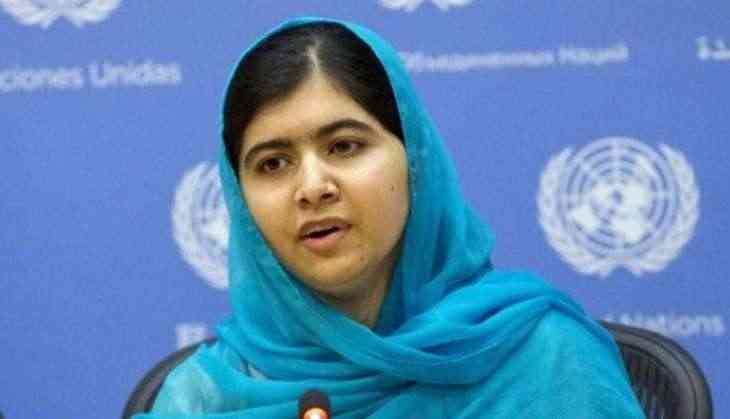
Men should not clip the "wings of women and let them fly", Nobel Laureate Malala Yousafzai said as UN Secretary-General Antonio Guterres designated her as the youngest-ever 'Messenger of Peace'.
"The role of men, fathers and brothers is really important. There were so many girls just like me in Swat Valley who could have spoken out but their fathers did not allow them, their brothers did not allow them to do so," the 19-year-old Pakistani education activist said.
She said her case was different as her father did not stop her, Malala said during a ceremony here yesterday to designate her the UN Messenger of Peace, the highest honour bestowed by the Secretary-General on a global citizen.
"... All I had was a father and a family who said 'yes you can speak. It is your choice'. I think that is what we need. We need brothers and fathers and all men in the family to let women be who they want to be."
She said her father always told people not to ask him what he did for Malala, 'but ask what I didn't do - I didn't clip her wings.'
"Men should not clip the wings of women and let them fly and let them go forward," Yousafzai said, as her father Ziauddin Yousafzai sat in the audience and watched her.
Yousafzai, who was shot in 2012 by the Taliban for attending classes, is the youngest-ever UN Messenger of Peace and the first one to be designated by Guterres since he assumed office in January this year.
With the designation, Yousafzai joins other current Messengers of Peace including Oscar-winning actor Leonardo di Caprio for climate change, actor Charlize Theron, whose focus is prevention of HIV and elimination of violence against women and actor Michael Douglas whose focus is disarmament.
"It is for me a very emotional day to be here with you. You are the symbol of one of the most important causes in the world - probably the most important cause in the world - and that is education, education for all, and particularly because we know it is more difficult in many societies - education for girls," Guterres said.
While recovering from the Taliban attack, Yousafzai said she realised "extremists tried everything to stop me (and the fact that they didn't) is clear evidence that no one can stop me. They tried to kill me and they didn't succeed. Now this is a new life, this is a second life and it is for the purpose of education and I'll continue working on (this issue)."
Accepting the accolade, Yousafzai underscored the importance of education, especially education of girls, for advancing communities and societies.
"(Bringing change) starts with us and it should start now," she said, adding "If you want to see your future bright, you have to start working now (and) not wait for anyone else."
UN Messengers of Peace are distinguished individuals, carefully selected from the fields of art, literature, science, entertainment, sports or other fields of public life, who have agreed to help focus worldwide attention on the work of the global Organisation.
Taking a question from a young speaker in the audience,
Yousafzai said the most difficult time she faced had been from 2007 to 2009 in the Swat Valley, "because we were at a point of making a decision about whether to speak out or remain silent. And I realised that if you remain silent, you are still going to be terrorised. So speaking out, you can help people."
Guterrers called Yousafzai's life "a remarkable example of solidarity." He added that "we live in a world where so many borders are closed; so many doors are closed" but leaders should know that "it is not by closing doors that we will all be able to move forward."
In 2013, Yousafzai and her father Ziauddin Yousafzai co-founded the Malala Fund to bring awareness to the social and economic impact of girls' education, and to empower girls to demand change.
She became the youngest-ever Nobel Peace Prize laureate in December 2014, sharing the honour with Indian children's rights and education advocate Kailash Satyarthi.
-PTI


